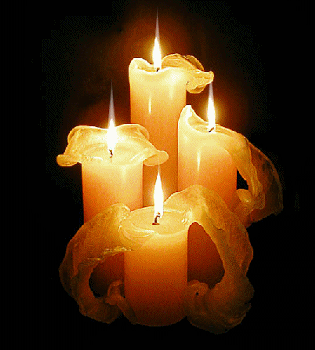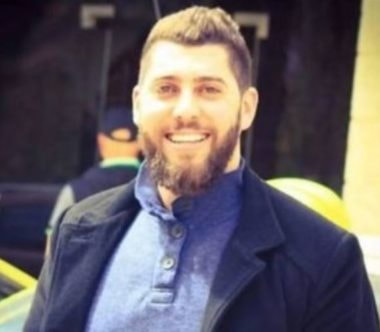28 dec 2018
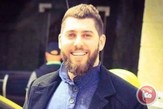
Palestinian human rights organization Al-Haq sent a joint urgent appeal to the United Nations (UN) Special Procedures regarding the enforced disappearance of Palestinian citizen Saleh Omar Barghouthi, 29, following his detention by Israeli forces near the town of Surda, north of Ramallah in the central occupied West Bank, on 12 December 2018.
The Enforced Disappearance of Saleh Omar Barghouthi:
According to Al-Haq’s documentation, between 6:40 pm and 7:00 pm on the evening of Wednesday, 12 December, a blue SsangYong jeep, with a Palestinian license plate, hit a yellow taxi that was in front of it near Surda, on the road leading to Birzeit. Eyewitnesses who arrived at the scene thought it was a car accident and got out of the car to see what had happened. One witness told Al-Haq that about ten masked Israeli soldiers wearing black uniforms came out of a white Mercedes bus, which had a Palestinian license plate, pointed their rifles at Palestinians approaching the scene, and shouted at them to get back in their cars. In an affidavit to Al-Haq, the same eyewitness stated:
“I saw a group of soldiers attacking the KIA taxi and I heard the sound of three to four bullets as I saw a soldier pointing his weapon into the window of the taxi driver’s car. The sound of the gunshots was muffled. I think that the shots might have been fired using a silencer and that the soldier might have shot the driver from a very close distance. Then the soldiers opened the car door, pulled the driver out of the car, and threw him down onto the [ground]… I saw them tying his hands behind his back and then carrying him and putting him in the white bus.”
Another eyewitness, Rami Hamdan, 35, who saw the scene from the other side of the road, stated:
“I saw ten masked men, six in the bus and four in the jeep, wearing black, two of them holding rifles. They surrounded the taxi…One of them used his rifle to crash the window next to the driver’s seat. Then three members of the [Israeli] forces opened the driver’s door, pulled the driver out, and threw him onto the ground… they tied his hands and legs, covered his eyes, and threw him in the white [bus]…”
After the IOF took Saleh and withdrew from the scene, some of the eyewitnesses approached the taxi Saleh was driving and saw that the window next to the driver and the window behind it were shattered. They did not see any blood in the taxi or next to it, while one eyewitness noticed traces of bullet penetration in the driver’s seat, above the left shoulder, and in the centre of the seat behind the driver. It is also worth noting that several eyewitnesses saw an empty shell casing next to the door of the car on the driver’s side.
Several hours after the disappearance of Saleh Barghouthi, on 12 December, Israeli media reported that “the Counter Terrorism Unit of the [Israeli] Border Police, Yamam, killed a Palestinian suspected of involvement in the shooting attack outside of Ofra on Sunday.” In a statement issued on 15 December 2018, Saleh’s family called into question the facts of the alleged killing. Saleh’s father, Omar Barghouthi, was informed by an Israeli intelligence officer of his son’s death admitting, “we killed Saleh.” On the basis of information available to them, the family concluded, that:
“the possibility of life or death is a mystery, which must be addressed by official bodies and human rights groups, while it requires… the examination of the body. As a result, the family believes that the killing was either carried out after the arrest or that Saleh’s killing may be imminent”.
Al-Haq notes that, on 20 December 2018, the Jerusalem Legal Aid and Human Rights Center (JLAC) received further information on the case of Saleh Barghouthi, following a request submitted to the Israeli occupying authorities. In their response to JLAC, the Israeli authorities admitted that Saleh was alive at the time he was arrested and alleged that Saleh was then taken to a hospital, where he is said to have died of his wounds, a few hours later. However, no response was given to JLAC’s request to allow Saleh’s mother to identify the body and to see him inside his place of detention, nor did the Israeli authorities provide any information related to Saleh’s arrest or injury.
Al-Haq emphasizes that the response given by the IOF to JLAC reveals inconsistencies with the initial account given to Omar Barghouthi to the effect that his son has been killed by the IOF. Instead, this response to JLAC provides an entirely different account, in that the Israeli authorities now allege that Saleh was taken to a hospital, where he later died of injuries. Taken jointly with the information available to Al-Haq, the second account, rather than attest to the fate of Saleh Barghouthi, only emphasizes that Saleh has been subjected to an enforced disappearance. Critically, Saleh’s mother continues to be denied the right to see Saleh and to confirm her son’s identity.
Al-Haq also notes that the reply by the Israeli occupying authorities to JLAC, stating that Saleh died following his arrest, does not indicate the circumstances in which Saleh was killed while in Israeli custody nor where he is currently held. Notably, Al-Haq recalls that, according to the UN Working Group on Enforced or Involuntary Disappearances:
“a detention followed by an extrajudicial execution… is an enforced disappearance proper, as long as such detention or deprivation of liberty was carried out by governmental agents… and, subsequent to the detention, or even after the execution was carried out, State officials refuse to disclose the fate or whereabouts of the persons concerned”.
Legal Analysis
In its urgent appeal to the UN Special Procedures, Al-Haq stressed that family members have the right to be informed of the circumstances of Saleh’s arrest and detention and possible death, and that the lack of evidence to the effect that he has been killed causes his family mental anguish and stress, which amounts to cruel, inhuman, or degrading treatment or punishment.[7] In addition, Al-Haq noted that the arrest and detention of Saleh Barghouthi were conducted in violation of international human rights and international humanitarian law applicable in the Occupied Palestinian Territory (OPT), stressing that arbitrary detention during armed conflict is specifically prohibited under customary international law governing hostilities in order “to prevent disappearance”.
Al-Haq further noted that, should Saleh have been killed following his arrest and detention by the IOF, or otherwise succumbed to the wounds sustained from IOF fire while in Israeli custody, then Israel, as Occupying Power, bears the full responsibility for the arbitrary deprivation of his life, in violation of Article 6(1) of the ICCPR. Moreover, Al-Haq stressed that the withholding of Saleh’s body amounts to cruel, inhuman, or degrading treatment or punishment against Saleh’s family, in violation of Article 7 of the ICCPR, and to collective punishment, prohibited under Article 33 of the Fourth Geneva Convention (1949).
Critically, Al-Haq’s stressed that its documentation of the incident indicates the absence of conclusive evidence as to the alleged killing of Saleh Barghouthi in the location of his arrest and detention by Israeli forces, amounting to an enforced disappearance, within the meaning of Article 2 of the International Convention for the Protection of All Persons from Enforced Disappearance (ICPPED). Under the Convention, the three cumulative constitutive elements are met in addition to the placing of the victim outside of the protection of the law as a consequence.Notably, Saleh was detained and as a result deprived of his liberty; moreover, the deprivation of liberty was carried out by agents of the State of Israel, in this case Israeli soldiers; third, the incident was followed by the Israeli occupying authorities’ concealment of the fate or whereabouts of the disappeared person.
Indeed, the conflicting messages revealed by the IOF, first to Omar Barghouthi and then to JLAC, reveal that there has been an attempt to conceal the circumstances in which Saleh was arrested, detained, and possibly killed, while they fail to disclose his current whereabouts. Saleh’s detention may qualify as enforced disappearance even if the former constitutes “short-term detention” of “a few hours or days.”
The alleged enforced disappearance of Saleh Barghouthi is a violation of multiple rights, continuing to the point at which his fate and whereabouts are established. Al-Haq emphasizes that Saleh’s family members hold the right to know the truth as entailed by the right of the victim or her/his next of kin to obtain clarification about the circumstances and reasons for disappearances. While Israel has not ratified the ICPPED, enforced disappearances comprise a serious violation of customary international humanitarian law. According to the International Committee of the Red Cross (ICRC), “any enforced disappearance is a violation of international humanitarian law and human rights law.”
Accordingly, in its submission to the UN Special Procedures, Al-Haq stressed that the burden of proof lies with Israel, as Occupying Power, to establish the facts of the incident and to ensure effective, independent, transparent, and public investigations into the matter. Without any proof to the contrary, Al-Haq stresses that Saleh Barghouthi has been subjected to an enforced disappearance and calls on the Israeli occupying authorities to disclose the circumstances in which Saleh Barghouthi was arrested, detained, and injured, to ensure Saleh’s family is adequately informed of his fate and whereabouts, and that Saleh’s body is returned to his family for a dignified burial, without further undue delay. Al-Haq is currently following up on the case of Saleh Barghouthi with relevant international bodies.
The Enforced Disappearance of Saleh Omar Barghouthi:
According to Al-Haq’s documentation, between 6:40 pm and 7:00 pm on the evening of Wednesday, 12 December, a blue SsangYong jeep, with a Palestinian license plate, hit a yellow taxi that was in front of it near Surda, on the road leading to Birzeit. Eyewitnesses who arrived at the scene thought it was a car accident and got out of the car to see what had happened. One witness told Al-Haq that about ten masked Israeli soldiers wearing black uniforms came out of a white Mercedes bus, which had a Palestinian license plate, pointed their rifles at Palestinians approaching the scene, and shouted at them to get back in their cars. In an affidavit to Al-Haq, the same eyewitness stated:
“I saw a group of soldiers attacking the KIA taxi and I heard the sound of three to four bullets as I saw a soldier pointing his weapon into the window of the taxi driver’s car. The sound of the gunshots was muffled. I think that the shots might have been fired using a silencer and that the soldier might have shot the driver from a very close distance. Then the soldiers opened the car door, pulled the driver out of the car, and threw him down onto the [ground]… I saw them tying his hands behind his back and then carrying him and putting him in the white bus.”
Another eyewitness, Rami Hamdan, 35, who saw the scene from the other side of the road, stated:
“I saw ten masked men, six in the bus and four in the jeep, wearing black, two of them holding rifles. They surrounded the taxi…One of them used his rifle to crash the window next to the driver’s seat. Then three members of the [Israeli] forces opened the driver’s door, pulled the driver out, and threw him onto the ground… they tied his hands and legs, covered his eyes, and threw him in the white [bus]…”
After the IOF took Saleh and withdrew from the scene, some of the eyewitnesses approached the taxi Saleh was driving and saw that the window next to the driver and the window behind it were shattered. They did not see any blood in the taxi or next to it, while one eyewitness noticed traces of bullet penetration in the driver’s seat, above the left shoulder, and in the centre of the seat behind the driver. It is also worth noting that several eyewitnesses saw an empty shell casing next to the door of the car on the driver’s side.
Several hours after the disappearance of Saleh Barghouthi, on 12 December, Israeli media reported that “the Counter Terrorism Unit of the [Israeli] Border Police, Yamam, killed a Palestinian suspected of involvement in the shooting attack outside of Ofra on Sunday.” In a statement issued on 15 December 2018, Saleh’s family called into question the facts of the alleged killing. Saleh’s father, Omar Barghouthi, was informed by an Israeli intelligence officer of his son’s death admitting, “we killed Saleh.” On the basis of information available to them, the family concluded, that:
“the possibility of life or death is a mystery, which must be addressed by official bodies and human rights groups, while it requires… the examination of the body. As a result, the family believes that the killing was either carried out after the arrest or that Saleh’s killing may be imminent”.
Al-Haq notes that, on 20 December 2018, the Jerusalem Legal Aid and Human Rights Center (JLAC) received further information on the case of Saleh Barghouthi, following a request submitted to the Israeli occupying authorities. In their response to JLAC, the Israeli authorities admitted that Saleh was alive at the time he was arrested and alleged that Saleh was then taken to a hospital, where he is said to have died of his wounds, a few hours later. However, no response was given to JLAC’s request to allow Saleh’s mother to identify the body and to see him inside his place of detention, nor did the Israeli authorities provide any information related to Saleh’s arrest or injury.
Al-Haq emphasizes that the response given by the IOF to JLAC reveals inconsistencies with the initial account given to Omar Barghouthi to the effect that his son has been killed by the IOF. Instead, this response to JLAC provides an entirely different account, in that the Israeli authorities now allege that Saleh was taken to a hospital, where he later died of injuries. Taken jointly with the information available to Al-Haq, the second account, rather than attest to the fate of Saleh Barghouthi, only emphasizes that Saleh has been subjected to an enforced disappearance. Critically, Saleh’s mother continues to be denied the right to see Saleh and to confirm her son’s identity.
Al-Haq also notes that the reply by the Israeli occupying authorities to JLAC, stating that Saleh died following his arrest, does not indicate the circumstances in which Saleh was killed while in Israeli custody nor where he is currently held. Notably, Al-Haq recalls that, according to the UN Working Group on Enforced or Involuntary Disappearances:
“a detention followed by an extrajudicial execution… is an enforced disappearance proper, as long as such detention or deprivation of liberty was carried out by governmental agents… and, subsequent to the detention, or even after the execution was carried out, State officials refuse to disclose the fate or whereabouts of the persons concerned”.
Legal Analysis
In its urgent appeal to the UN Special Procedures, Al-Haq stressed that family members have the right to be informed of the circumstances of Saleh’s arrest and detention and possible death, and that the lack of evidence to the effect that he has been killed causes his family mental anguish and stress, which amounts to cruel, inhuman, or degrading treatment or punishment.[7] In addition, Al-Haq noted that the arrest and detention of Saleh Barghouthi were conducted in violation of international human rights and international humanitarian law applicable in the Occupied Palestinian Territory (OPT), stressing that arbitrary detention during armed conflict is specifically prohibited under customary international law governing hostilities in order “to prevent disappearance”.
Al-Haq further noted that, should Saleh have been killed following his arrest and detention by the IOF, or otherwise succumbed to the wounds sustained from IOF fire while in Israeli custody, then Israel, as Occupying Power, bears the full responsibility for the arbitrary deprivation of his life, in violation of Article 6(1) of the ICCPR. Moreover, Al-Haq stressed that the withholding of Saleh’s body amounts to cruel, inhuman, or degrading treatment or punishment against Saleh’s family, in violation of Article 7 of the ICCPR, and to collective punishment, prohibited under Article 33 of the Fourth Geneva Convention (1949).
Critically, Al-Haq’s stressed that its documentation of the incident indicates the absence of conclusive evidence as to the alleged killing of Saleh Barghouthi in the location of his arrest and detention by Israeli forces, amounting to an enforced disappearance, within the meaning of Article 2 of the International Convention for the Protection of All Persons from Enforced Disappearance (ICPPED). Under the Convention, the three cumulative constitutive elements are met in addition to the placing of the victim outside of the protection of the law as a consequence.Notably, Saleh was detained and as a result deprived of his liberty; moreover, the deprivation of liberty was carried out by agents of the State of Israel, in this case Israeli soldiers; third, the incident was followed by the Israeli occupying authorities’ concealment of the fate or whereabouts of the disappeared person.
Indeed, the conflicting messages revealed by the IOF, first to Omar Barghouthi and then to JLAC, reveal that there has been an attempt to conceal the circumstances in which Saleh was arrested, detained, and possibly killed, while they fail to disclose his current whereabouts. Saleh’s detention may qualify as enforced disappearance even if the former constitutes “short-term detention” of “a few hours or days.”
The alleged enforced disappearance of Saleh Barghouthi is a violation of multiple rights, continuing to the point at which his fate and whereabouts are established. Al-Haq emphasizes that Saleh’s family members hold the right to know the truth as entailed by the right of the victim or her/his next of kin to obtain clarification about the circumstances and reasons for disappearances. While Israel has not ratified the ICPPED, enforced disappearances comprise a serious violation of customary international humanitarian law. According to the International Committee of the Red Cross (ICRC), “any enforced disappearance is a violation of international humanitarian law and human rights law.”
Accordingly, in its submission to the UN Special Procedures, Al-Haq stressed that the burden of proof lies with Israel, as Occupying Power, to establish the facts of the incident and to ensure effective, independent, transparent, and public investigations into the matter. Without any proof to the contrary, Al-Haq stresses that Saleh Barghouthi has been subjected to an enforced disappearance and calls on the Israeli occupying authorities to disclose the circumstances in which Saleh Barghouthi was arrested, detained, and injured, to ensure Saleh’s family is adequately informed of his fate and whereabouts, and that Saleh’s body is returned to his family for a dignified burial, without further undue delay. Al-Haq is currently following up on the case of Saleh Barghouthi with relevant international bodies.
27 dec 2018

An Israeli military court renewed on Thursday the detention of an elderly Palestinian prisoner for five days in spite of his deteriorating health condition, the Palestinian Prisoner Society (PPS) said.
According to the PPS, the detention of Omar Barghouti, 66, was extended for five days pending investigation.
Barghouti was detained along with his son, Asef, on December 12 from his home hours after Israeli soldiers shot and killed his son, Saleh, outside Ramallah.
PPS said Omar Barghouti, who himself had already spent a total of 26 years in Israeli prisons some he served as administrative detainee without charge or trial and based on “secret evidence”, had a heart attack in recent years and underwent several surgeries. He is also diabetic and takes 12 kinds of medicines.
Yet, he is kept in a small and cold cell at the notorious al-Maskoubia Compound and is forced to sleep on the cold ground.
Omar Barghouti’s brother, Nael Barghouti, has been in prison for 39 years.
According to the PPS, the detention of Omar Barghouti, 66, was extended for five days pending investigation.
Barghouti was detained along with his son, Asef, on December 12 from his home hours after Israeli soldiers shot and killed his son, Saleh, outside Ramallah.
PPS said Omar Barghouti, who himself had already spent a total of 26 years in Israeli prisons some he served as administrative detainee without charge or trial and based on “secret evidence”, had a heart attack in recent years and underwent several surgeries. He is also diabetic and takes 12 kinds of medicines.
Yet, he is kept in a small and cold cell at the notorious al-Maskoubia Compound and is forced to sleep on the cold ground.
Omar Barghouti’s brother, Nael Barghouti, has been in prison for 39 years.
21 dec 2018

The Israeli occupation forces (IOF) at dawn Friday arrested five Palestinians during large-scale raids into different West Bank areas.
Local sources said that the IOF arrested Husni al-Najjar and Qutaiba al-Nawaj'a after raiding their houses in al-Khalil.
The sources added that the IOF arrested Jubran Jubran and another Palestinian whose identity is still unknown during Ramallah break-ins.
They pointed out that the IOF stormed several Palestinian shops in Ramallah, destroyed their doors, and confiscated their surveillance camera recordings.
The Israeli occupation army has earlier announced Ramallah a closed military zone and installed dozens of checkpoints at the entrances to Ramallah villages and towns following an alleged shooting attack on Ofra settlement.
The IOF at daybreak stormed the nearby Kobar village and raided many Palestinian homes.
Local residents said that the IOF broke into the houses of the Palestinian martyr Saleh al-Barghouti and his brother Asem, and took their measurements in preparation for their demolition.
Saleh al-Barghouti was shot dead on 12 December by Israeli special forces in Surda village, north of Ramallah.
The Israeli forces claim that Saleh carried out a shooting attack near Ofra settlement injuring seven Israeli settlers about two weeks ago.
Al-Barghouti's brother, Asem, whose whereabouts have been unknown lately, is accused of killing two Israeli soldiers in another shooting attack near Giv'at Asaf settlement, east of Ramallah.
The IOF last week blew up the houses of the Palestinian prisoner Islam Abu Hmeid and martyr Ashraf Na'alweh over similar accusations.
Local sources said that the IOF arrested Husni al-Najjar and Qutaiba al-Nawaj'a after raiding their houses in al-Khalil.
The sources added that the IOF arrested Jubran Jubran and another Palestinian whose identity is still unknown during Ramallah break-ins.
They pointed out that the IOF stormed several Palestinian shops in Ramallah, destroyed their doors, and confiscated their surveillance camera recordings.
The Israeli occupation army has earlier announced Ramallah a closed military zone and installed dozens of checkpoints at the entrances to Ramallah villages and towns following an alleged shooting attack on Ofra settlement.
The IOF at daybreak stormed the nearby Kobar village and raided many Palestinian homes.
Local residents said that the IOF broke into the houses of the Palestinian martyr Saleh al-Barghouti and his brother Asem, and took their measurements in preparation for their demolition.
Saleh al-Barghouti was shot dead on 12 December by Israeli special forces in Surda village, north of Ramallah.
The Israeli forces claim that Saleh carried out a shooting attack near Ofra settlement injuring seven Israeli settlers about two weeks ago.
Al-Barghouti's brother, Asem, whose whereabouts have been unknown lately, is accused of killing two Israeli soldiers in another shooting attack near Giv'at Asaf settlement, east of Ramallah.
The IOF last week blew up the houses of the Palestinian prisoner Islam Abu Hmeid and martyr Ashraf Na'alweh over similar accusations.
20 dec 2018
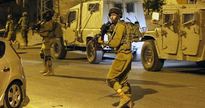
A number of Palestinians were kidnapped by the Israeli occupation forces at daybreak Thursday in abduction sweeps rocking the West Bank and Jerusalem.
The Israeli army claimed responsibility for the abduction of six Palestinians overnight over allegations of involvement in anti-occupation activities and protests.
The campaign targeted Palestinian civilians and activists from Kober town, in Ramallah.
Local sources said Israeli soldiers wreaked havoc on civilian homes in Kober, including the homes of the relatives of prisoner Omar al-Barghouthi, the father of slain anti-occupation attacker Saleh al-Barghouthi. His wife had been subjected to intensive questioning.
Israeli patrols further stormed Tubas city, north of occupied Jerusalem, and ransacked civilian homes.
At the same time, the mother of prisoner Mohamed Salah al-Deen was kidnapped by the occupation forces from Jerusalem’s town of Hizma at daybreak.
The Israeli army claimed responsibility for the abduction of six Palestinians overnight over allegations of involvement in anti-occupation activities and protests.
The campaign targeted Palestinian civilians and activists from Kober town, in Ramallah.
Local sources said Israeli soldiers wreaked havoc on civilian homes in Kober, including the homes of the relatives of prisoner Omar al-Barghouthi, the father of slain anti-occupation attacker Saleh al-Barghouthi. His wife had been subjected to intensive questioning.
Israeli patrols further stormed Tubas city, north of occupied Jerusalem, and ransacked civilian homes.
At the same time, the mother of prisoner Mohamed Salah al-Deen was kidnapped by the occupation forces from Jerusalem’s town of Hizma at daybreak.
18 dec 2018

The Arab Federation for Human Rights on Monday called for the formation of international commission of inquiry into the Israeli army's execution of a Palestinian young man after he was arrested alive a few days ago.
The London-based Arab Federation said in a statement that the testimonies and circumstances surrounding the killing of Saleh al-Barghouti, 30, by the Israeli army raise serious doubts about a deliberate execution.
The Federation said that it had received a complaint from al-Barghouti's family asking for mandating an international committee to examine the body and investigate the incident. The family affirmed that their son was announced dead three hours after he was arrested alive.
Al-Barghouti's family said that the Israeli occupation forces opened fire at the car Saleh was driving in Ramallah on Wednesday evening although he did not show any escape attempt.
According to the family and eyewitnesses, Saleh was not injured in the attack since no traces of blood were found inside or outside the car, which confirms that Saleh was alive when the Israeli forces kidnapped him.
Following about an hour of his arrest, Israeli media started to talk about Saleh's death, while the Israeli army's official statement was released three hours after the incident without confirming the news.
The Arab Federation, quoting al-Barghouti's family, pointed out that an Israeli intelligence officer later phoned the father and told him in an aggressive tone, "We killed your son."
The Arab Federation added that the Palestinian Authority Civil Liaison said that they received four conflicting accounts from the Israeli army on the incident and Saleh's health condition before his death was finally confirmed.
It stressed that what happened to Saleh al-Barghouti raises suspicion of extrajudicial killing, which requires the opening of an international investigation to hold the Israeli army accountable for the crime.
The London-based Arab Federation said in a statement that the testimonies and circumstances surrounding the killing of Saleh al-Barghouti, 30, by the Israeli army raise serious doubts about a deliberate execution.
The Federation said that it had received a complaint from al-Barghouti's family asking for mandating an international committee to examine the body and investigate the incident. The family affirmed that their son was announced dead three hours after he was arrested alive.
Al-Barghouti's family said that the Israeli occupation forces opened fire at the car Saleh was driving in Ramallah on Wednesday evening although he did not show any escape attempt.
According to the family and eyewitnesses, Saleh was not injured in the attack since no traces of blood were found inside or outside the car, which confirms that Saleh was alive when the Israeli forces kidnapped him.
Following about an hour of his arrest, Israeli media started to talk about Saleh's death, while the Israeli army's official statement was released three hours after the incident without confirming the news.
The Arab Federation, quoting al-Barghouti's family, pointed out that an Israeli intelligence officer later phoned the father and told him in an aggressive tone, "We killed your son."
The Arab Federation added that the Palestinian Authority Civil Liaison said that they received four conflicting accounts from the Israeli army on the incident and Saleh's health condition before his death was finally confirmed.
It stressed that what happened to Saleh al-Barghouti raises suspicion of extrajudicial killing, which requires the opening of an international investigation to hold the Israeli army accountable for the crime.
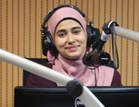
Ayat Dahadeha
The Israeli occupation forces (IOF) at dawn Tuesday carried out widespread raids on homes and kidnapped over 20 Palestinian citizens, including a woman, during campaigns in different West Bank areas.
According to Israel’s Channel 7, Israeli security and military forces arrested 24 Palestinians in the West Bank.
Among the detainees is Ayat Dahadeha, the sister-in-law of martyr Saleh al-Barghouthi who was killed a few days ago by Israeli soldiers.
Other citizens, including ex-detainees, were taken prisoners during IOF campaigns in areas and towns in Ramallah, Jenin, Jerusalem, Qalqilya, Bethlehem, al-Khalil and Nablus.
The IOF also raided homes of several ex-detainees, including the house of senior Hamas official Sheikh Hasan al-Wardiyan and the house of his son, Mahmoud, in Bethlehem.
The Israeli occupation forces (IOF) at dawn Tuesday carried out widespread raids on homes and kidnapped over 20 Palestinian citizens, including a woman, during campaigns in different West Bank areas.
According to Israel’s Channel 7, Israeli security and military forces arrested 24 Palestinians in the West Bank.
Among the detainees is Ayat Dahadeha, the sister-in-law of martyr Saleh al-Barghouthi who was killed a few days ago by Israeli soldiers.
Other citizens, including ex-detainees, were taken prisoners during IOF campaigns in areas and towns in Ramallah, Jenin, Jerusalem, Qalqilya, Bethlehem, al-Khalil and Nablus.
The IOF also raided homes of several ex-detainees, including the house of senior Hamas official Sheikh Hasan al-Wardiyan and the house of his son, Mahmoud, in Bethlehem.
13 dec 2018
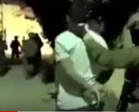
Israeli soldiers abducted, overnight and at dawn Thursday, at least 38 Palestinians, including 19 from occupied East Jerusalem, during massive invasions and violent searches of homes and property in several parts of the West Bank.
In Tulkarem, in northern West Bank, the soldiers abducted a former political prisoner, identified as Bakr Mohammad Salim Kharyoush, 27, after smashing the doors of his home and breaking into it.
In Ramallah, in central West Bank, the soldiers searched many homes and abducted Omar al-Barghouthi, his brother Assef Barghouthi, and his brother-in-law, Hadi Barghouthi, in addition to Khaled Zeebar, and two former political prisoners, identified as Monir al-‘Abed and Khaled al-‘Abed, all from Kobar village, northwest of Ramallah.
It is worth mentioning that Omar al-Barghouthi is the father of Saleh Omar al-Barghouthi, 29, who was killed by undercover Israeli soldiers, on Wednesday evening, in Surda Palestinian village, near Ramallah.
In occupied Jerusalem, the soldiers invaded many neighborhoods before storming and searching homes, interrogated dozens of Palestinians and abducted at least nineteen young men.
The abducted Palestinians have been identified as Morad Zaghari, Mohammad Dabbagh, Nafeth al-Jo’ba, Fadi al-Jo’ba, Majed al-Jo’ba, Mohammad Ghneim an-Nansh, Omar Mheisin, Khader al-‘Ajlouni, Ahmad Jaber, Amro Abu Arafa, Jihad Qous, Younes Ashour, Khader al-‘Ajlouni, Mohammad Ashour, Luay Nassereddin, Hamza Milhis, Khaled Milhis, Emad Abu Sneina and Abu Wael al-Fakhouri.
In Tubas, in northeastern West Bank, the soldiers abducted Faze’ Sawafta, Omar Hamza Daraghma, and Mohammad Emad Sawafta, from their homes, and Fadi Bashar Abdul-Razeq, who was taken prisoner at the southern entrance of Jericho city.
Furthermore, the soldiers abduct Ala Ibreiwish, from his home in Doura town, south of the southern West Bank city of Hebron, and Murad Yousef Salayma, 27, from Hebron city.
Also in Hebron, the soldiers invaded and searched the home of Soheib Abu Jaroush, and summoned him for interrogation.
In Tulkarem, in northern West Bank, the soldiers abducted a former political prisoner, identified as Bakr Mohammad Salim Kharyoush, 27, after smashing the doors of his home and breaking into it.
In Ramallah, in central West Bank, the soldiers searched many homes and abducted Omar al-Barghouthi, his brother Assef Barghouthi, and his brother-in-law, Hadi Barghouthi, in addition to Khaled Zeebar, and two former political prisoners, identified as Monir al-‘Abed and Khaled al-‘Abed, all from Kobar village, northwest of Ramallah.
It is worth mentioning that Omar al-Barghouthi is the father of Saleh Omar al-Barghouthi, 29, who was killed by undercover Israeli soldiers, on Wednesday evening, in Surda Palestinian village, near Ramallah.
In occupied Jerusalem, the soldiers invaded many neighborhoods before storming and searching homes, interrogated dozens of Palestinians and abducted at least nineteen young men.
The abducted Palestinians have been identified as Morad Zaghari, Mohammad Dabbagh, Nafeth al-Jo’ba, Fadi al-Jo’ba, Majed al-Jo’ba, Mohammad Ghneim an-Nansh, Omar Mheisin, Khader al-‘Ajlouni, Ahmad Jaber, Amro Abu Arafa, Jihad Qous, Younes Ashour, Khader al-‘Ajlouni, Mohammad Ashour, Luay Nassereddin, Hamza Milhis, Khaled Milhis, Emad Abu Sneina and Abu Wael al-Fakhouri.
In Tubas, in northeastern West Bank, the soldiers abducted Faze’ Sawafta, Omar Hamza Daraghma, and Mohammad Emad Sawafta, from their homes, and Fadi Bashar Abdul-Razeq, who was taken prisoner at the southern entrance of Jericho city.
Furthermore, the soldiers abduct Ala Ibreiwish, from his home in Doura town, south of the southern West Bank city of Hebron, and Murad Yousef Salayma, 27, from Hebron city.
Also in Hebron, the soldiers invaded and searched the home of Soheib Abu Jaroush, and summoned him for interrogation.
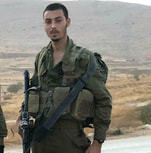
Sergeant Yovel Moryosef, 20
Israeli sources have reported that two settlers were killed, and two others were injured, in a shooting attack close to the illegal colony of Ofra, near Ramallah, in central West Bank.
The shooting took place at the hitchhiking section of Givat Assag, in the Benyamin Regional Council of Settlements, between Beit El and Ofra, illegal colonies.
Israeli sources have reported that two settlers were killed, and two others were injured, in a shooting attack close to the illegal colony of Ofra, near Ramallah, in central West Bank.
The shooting took place at the hitchhiking section of Givat Assag, in the Benyamin Regional Council of Settlements, between Beit El and Ofra, illegal colonies.
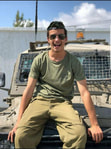
Corporal Yosef Cohen, 19
Israeli said Magen David Adom national emergency medics rushed to the scene, and provided treatment to two wounded settlers.
They moved an Israeli man, who suffered a severe gunshot wound to the head, to Hadassah Ein Karem hospital, and a woman to Shaarei Tzedek Medical Center, in occupied Jerusalem, suffering serious wounds.
The army said, according to its initial investigation, the shooter got out of a vehicle, before approaching the hitchhiking station, and opened fire at the people waiting there, then ran back to the car, where another man was behind the wheel, and both managed to escape unharmed.
The four settlers are in their twenties; the identities of the two killed Israelis are yet to be released.
Following the incident, dozens of colonialist settlers invaded the eastern area of ‘Asira al-Qibliya village, south of Nablus, before the Palestinians intercepted them, leading to confrontations.
The Israeli army also closed the Qalqilia-Nablus road, and installed dozens of roadblocks around Nablus, before stopping and searching hundreds of cars, and imposed a tight siege on Ramallah governorate.
In addition, the soldiers closed Huwwara military roadblock, south of Nablus, and prevented the Palestinians from crossing, while groups of colonialist settlers hurled stones at many Palestinian cars.
It is worth mentioning that, at 1 am on Thursday, a squadron of soldiers and police officers invaded Nablus, surrounded the house where a Palestinian suspected of killing two Israeli settlers, was believed to be hiding, and shot and killed the man, who was identified as Ashraf Waleed Suleiman Na’alwa, 23.
On Thursday at dawn, the soldiers killed a Palestinian, identified as Majd Mteir, 26, in the al-Waad Street, in the Old City of occupied Jerusalem, after he reportedly stabbed and injured two Israeli police officers.
On Wednesday evening, undercover Israeli soldiers assassinated a Palestinian Taxi driver, identified as Saleh Omar Saleh Barghouthi, 29, near Surda village, north of the central West Bank city of Ramallah; the army claimed the Palestinian was allegedly “involved” in the shooting targeting colonialist settlers, last Sunday.
Israeli said Magen David Adom national emergency medics rushed to the scene, and provided treatment to two wounded settlers.
They moved an Israeli man, who suffered a severe gunshot wound to the head, to Hadassah Ein Karem hospital, and a woman to Shaarei Tzedek Medical Center, in occupied Jerusalem, suffering serious wounds.
The army said, according to its initial investigation, the shooter got out of a vehicle, before approaching the hitchhiking station, and opened fire at the people waiting there, then ran back to the car, where another man was behind the wheel, and both managed to escape unharmed.
The four settlers are in their twenties; the identities of the two killed Israelis are yet to be released.
Following the incident, dozens of colonialist settlers invaded the eastern area of ‘Asira al-Qibliya village, south of Nablus, before the Palestinians intercepted them, leading to confrontations.
The Israeli army also closed the Qalqilia-Nablus road, and installed dozens of roadblocks around Nablus, before stopping and searching hundreds of cars, and imposed a tight siege on Ramallah governorate.
In addition, the soldiers closed Huwwara military roadblock, south of Nablus, and prevented the Palestinians from crossing, while groups of colonialist settlers hurled stones at many Palestinian cars.
It is worth mentioning that, at 1 am on Thursday, a squadron of soldiers and police officers invaded Nablus, surrounded the house where a Palestinian suspected of killing two Israeli settlers, was believed to be hiding, and shot and killed the man, who was identified as Ashraf Waleed Suleiman Na’alwa, 23.
On Thursday at dawn, the soldiers killed a Palestinian, identified as Majd Mteir, 26, in the al-Waad Street, in the Old City of occupied Jerusalem, after he reportedly stabbed and injured two Israeli police officers.
On Wednesday evening, undercover Israeli soldiers assassinated a Palestinian Taxi driver, identified as Saleh Omar Saleh Barghouthi, 29, near Surda village, north of the central West Bank city of Ramallah; the army claimed the Palestinian was allegedly “involved” in the shooting targeting colonialist settlers, last Sunday.
12 dec 2018

Saleh Omar Saleh Barghouthi, 29
Undercover Israeli soldiers assassinated, on Wednesday evening, a Palestinian Taxi driver, near Surda village, north of the central West Bank city of Ramallah; the army claimed the Palestinian was allegedly “involved” in the shooting targeting colonialist settlers, last Sunday.
The slain Palestinian has been identified as Saleh Omar Saleh Barghouthi, 29; eyewitnesses said he was driving his taxi when the undercover Israeli soldiers, driving an old commercial Mercedes, ambushed him, and opened fire at him, before abducting him while he was still alive, but severely injured and bleeding.
The army later said the Palestinian died from his wounds in a hospital in occupied Jerusalem.
Eyewitnesses said that the taxi remained in the middle of the road, after the soldiers shot Saleh, and added that a young man, identified as Wa’ad Barghouthi, tried to remove it from the road, but the undercover forces attacked and abducted him too.
Eyewitnesses said the undercover soldiers instantly opened fire at the car after ambushing it, in what appeared to be a clear assassination, not an attempt to abduct and imprison him.
The soldiers also abducted Ala’ Tarifi, who owns the Taxi company, when he tried to ask about Saleh’s condition.
Hours after killing Barghouthi, dozens of soldiers invaded Kobar village, northwest of Ramallah, and stormed his home where they forced his family in one room, and then removed the males from the property, before conducting extensive and violent searches.
The soldiers assaulted the family, and hurled concussion grenades in the property, eyewitnesses said.
The invasion into the village led to protests, and the army fired dozens of rubber-coated steel bullets and gas bombs.
Medical sources said the soldiers injured several Palestinian, including a child, and prevented a Palestinian ambulance from transferring the wounding child to a hospital in Ramallah.
The sources added that the army prevented many ambulances from entering Kobar.
The soldiers also invaded Ein Misbah area in the al-Biereh nearby city, and confiscated a Palestinian car, which looks similar to the one used in the shooting targeting the settlers.
Dozens of Palestinians hurled stones at the soldiers, while the army fired gas bombs and concussion grenades at them and at many homes and cars.
Among the wounded Israelis in the shooting incident is a pregnant woman, and her husband, who both remain hospitalized.
Israeli Ynet News has reported, Wednesday, that the doctors had to perform an emergency cesarean section on the injured mother, but the infant was announced dead.
In related news, the soldiers invaded Nabi Saleh village, northwest of Ramallah, and fired a barrage of gas bombs, concussion grenades and rubber-coated steel bullets at local protesters.
One Palestinian was shot with a gas bombs in his neck, and many others suffered the severe effects of teargas inhalation, especially when the the soldiers fired gas bombs and homes.
Local nonviolent activist Mohammad Tamimi said the soldiers also invaded and violently searched many homes in the village, and interrogated several Palestinians while inspecting their ID cards.
Undercover Israeli soldiers assassinated, on Wednesday evening, a Palestinian Taxi driver, near Surda village, north of the central West Bank city of Ramallah; the army claimed the Palestinian was allegedly “involved” in the shooting targeting colonialist settlers, last Sunday.
The slain Palestinian has been identified as Saleh Omar Saleh Barghouthi, 29; eyewitnesses said he was driving his taxi when the undercover Israeli soldiers, driving an old commercial Mercedes, ambushed him, and opened fire at him, before abducting him while he was still alive, but severely injured and bleeding.
The army later said the Palestinian died from his wounds in a hospital in occupied Jerusalem.
Eyewitnesses said that the taxi remained in the middle of the road, after the soldiers shot Saleh, and added that a young man, identified as Wa’ad Barghouthi, tried to remove it from the road, but the undercover forces attacked and abducted him too.
Eyewitnesses said the undercover soldiers instantly opened fire at the car after ambushing it, in what appeared to be a clear assassination, not an attempt to abduct and imprison him.
The soldiers also abducted Ala’ Tarifi, who owns the Taxi company, when he tried to ask about Saleh’s condition.
Hours after killing Barghouthi, dozens of soldiers invaded Kobar village, northwest of Ramallah, and stormed his home where they forced his family in one room, and then removed the males from the property, before conducting extensive and violent searches.
The soldiers assaulted the family, and hurled concussion grenades in the property, eyewitnesses said.
The invasion into the village led to protests, and the army fired dozens of rubber-coated steel bullets and gas bombs.
Medical sources said the soldiers injured several Palestinian, including a child, and prevented a Palestinian ambulance from transferring the wounding child to a hospital in Ramallah.
The sources added that the army prevented many ambulances from entering Kobar.
The soldiers also invaded Ein Misbah area in the al-Biereh nearby city, and confiscated a Palestinian car, which looks similar to the one used in the shooting targeting the settlers.
Dozens of Palestinians hurled stones at the soldiers, while the army fired gas bombs and concussion grenades at them and at many homes and cars.
Among the wounded Israelis in the shooting incident is a pregnant woman, and her husband, who both remain hospitalized.
Israeli Ynet News has reported, Wednesday, that the doctors had to perform an emergency cesarean section on the injured mother, but the infant was announced dead.
In related news, the soldiers invaded Nabi Saleh village, northwest of Ramallah, and fired a barrage of gas bombs, concussion grenades and rubber-coated steel bullets at local protesters.
One Palestinian was shot with a gas bombs in his neck, and many others suffered the severe effects of teargas inhalation, especially when the the soldiers fired gas bombs and homes.
Local nonviolent activist Mohammad Tamimi said the soldiers also invaded and violently searched many homes in the village, and interrogated several Palestinians while inspecting their ID cards.
Page: 2 - 1
